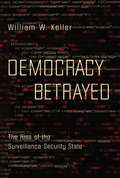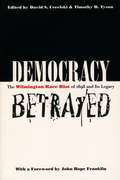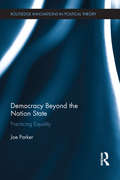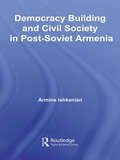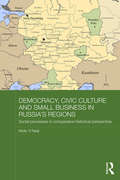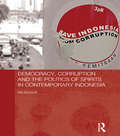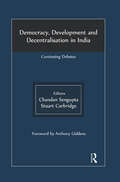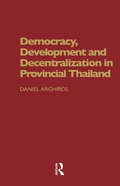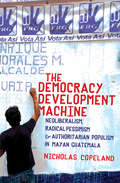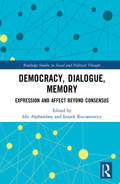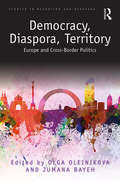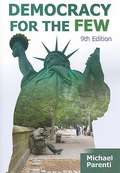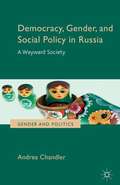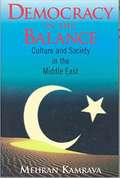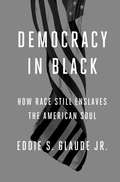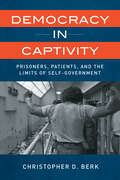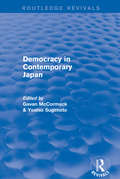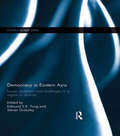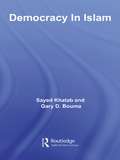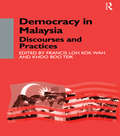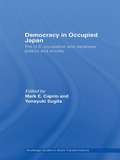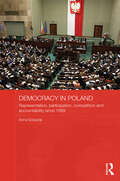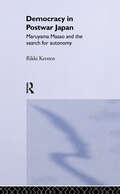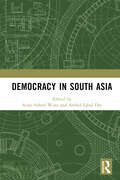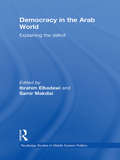- Table View
- List View
Democracy Betrayed: The Rise of the Surveillance Security State
by William W. Keller“A persuasive cri de coeur from a national security expert . . . makes a spirited case for preferring untrammeled freedom to managed and monitored safety.” —Kirkus Reviews In the aftermath of 9/11, in lockstep with booming technological advancements, a new and more authoritarian form of governance is supplanting liberal democracy. The creation of the Security Industrial Complex—an “internal security state-within-the-state” fueled by tech companies, private security firms, and the Intelligence Community to the tune of $120 billion a year—is intruding on civil liberties to an unprecedented extent. As a society, we have yet to comprehend the meaning of universal digital interconnection, its impact on our psychology, and its transformation of our government and society. America is at a crossroads in contending with a security goliath; allowing the beginnings of a police state, and the conversion of our “liberal democracy” to a “secure democracy”—one where government overreaches, tramples on civil liberties, and harnesses great advancements in technology to spy on the populace. Keller walks us through what these changes can mean to our society and, more importantly, what we can do to halt our march toward intrusive and widespread surveillance. “William Keller’s warning bell for democracy is both frightening and clarifying. We are caught into a rare convergence of technology and terrorism—both of which are overwhelming average citizens. Keller will help us think clearly about what we are facing.” —William Greider, author of One World, Ready or Not and national correspondent for The Nation
Democracy Betrayed
by Timothy B. Tyson David S. CecelskiAt the close of the nineteenth century, the Democratic Party in North Carolina engineered a white supremacy revolution. Frustrated by decades of African American self-assertion and threatened by an interracial coalition advocating democratic reforms, white conservatives used violence, demagoguery, and fraud to seize political power and disenfranchise black citizens. The most notorious episode of the campaign was the Wilmington "race riot" of 1898, which claimed the lives of many black residents and rolled back decades of progress for African Americans in the state.Published on the centennial of the Wilmington race riot, Democracy Betrayed draws together the best new scholarship on the events of 1898 and their aftermath. Contributors to this important book hope to draw public attention to the tragedy, to honor its victims, and to bring a clear and timely historical voice to the debate over its legacy.The contributors are David S. Cecelski, William H. Chafe, Laura F. Edwards, Raymond Gavins, Glenda E. Gilmore, John Haley, Michael Honey, Stephen Kantrowitz, H. Leon Prather Sr., Timothy B. Tyson, LeeAnn Whites, and Richard Yarborough.
Democracy Beyond the Nation State: Practicing Equality (Routledge Innovations in Political Theory)
by Joe ParkerDemocracy promises rule by all, not by the few. Yet, electoral democracies limit decision-making to representatives and have always had a weakness for inequality. How might democracy serve all rather than the few? Democracy Beyond the Nation State: Practicing Equality examines communities that govern their own lives without elites or centralized structures through assemblies and consensus. Rather than claiming equality by abstract rights or citizenship, these groups put equality into practice by reducing wealth and health divides, or landlessness or homelessness, and equalizing workloads. These practices are found in rural India and Brazil, in Buenos Aires, London, and New York, and among the Iroquois, the Zapatistas, and the global networks of La Via Campesina farmers and the World Social Forum. Readable accounts of these horizontal democracies document multiple political frames that prevent democracy from being frozen into entrenched electoral systems producing modern inequalities. Using practice to rewrite political theory, Parker draws on collective politics in Spivak and Derrida and embodied relations from Povinelli and Foucault to show that equal relations are not a utopian dream, not nostalgia, and not impossible. This book provides many practical solutions to inequality. It will be useful to students and scholars of political theory and social movements and to those who are willing to work together for equality.
Democracy Building and Civil Society in Post-Soviet Armenia (Routledge Contemporary Russia and Eastern Europe Series)
by Armine IshkanianThis volume considers the challenges of democracy building in post-Soviet Armenia, and the role of civil society in that process. It argues that, contrary to the expectations of Western aid donors, who promoted civil society on the assumption that democratization would follow from the establishment of civil society, democratic regimes have failed to materialize, and, moreover, a backlash has emerged in various post-Soviet states. Armine Ishkanian explores how far the growth of civil society depends on a country's historical, political and socio-cultural context; and how far foreign aid, often provided with conditions which encouraged the promotion of civil society, had an impact on democratization. Based on extensive original research, including fieldwork interviews with participants, Democracy Building and Civil Society in Post-Soviet Armenia considers various democratization initiatives in recent years, and assesses how far the Armenian experience is similar to, or different from, the experiences of other post-Soviet states.
Democracy, Civic Culture and Small Business in Russia's Regions: Social Processes in Comparative Historical Perspective (Routledge Contemporary Russia and Eastern Europe Series)
by Molly O'NealThis book adopts a novel analytical approach to understanding how Russia's stalled democratisation is related to the incomplete liberalisation of the economy. Based on extensive original comparative study of Russia’s regions, the book explores the precise channels of interaction that create the mutuality of property rights, entrepreneurship, rule of law, norms of citizenship and liberal democracy. It demonstrates that the extent of democratisation varies across regions, and that this variation is connected to the extent of liberalisation of the economy. Moreover, it argues that the key factor in producing this linkage is the relative prominence of small business owners and their supporters in articulating their interests vis-à-vis regional and local administrations, especially through the institutionalisation of networks and business associations. The book develops its key theses by means of detailed analysis of the experiences of four case study regions. Overall, the book provides a major contribution to understanding the path of democratisation in Russia.
Democracy, Corruption and the Politics of Spirits in Contemporary Indonesia (The Modern Anthropology of Southeast Asia)
by Nils BubandtIndonesia has been an electoral democracy for more than a decade, and yet the political landscape of the world’s third-largest democracy is as complex and enigmatic as ever. The country has achieved a successful transition to democracy and yet Indonesian democracy continues to be flawed, illiberal, and predatory. This book suggests that this and other paradoxes of democracy in Indonesia often assume occult forms in the Indonesian political imagination, and that the spirit-like character of democracy and corruption traverses into the national media and the political elite. Through a series of biographical accounts of political entrepreneurs, all of whom employ spirits in various, but always highly contested, ways, the book seeks to provide a portrait of Indonesia’s contradictory democracy, contending that the contradictions that haunt democracy in Indonesia also infect democracy globally. Exploring the intimate ways in which the world of politics and the world of spirits are entangled, it argues that Indonesia’s seemingly peculiar problems with democracy and spirits in fact reflect a set of contradictions within democracy itself. Engaging with recent attempts to look at contemporary politics through the lens of the occult, Democracy, Corruption and the Politics of Spirits in Contemporary Indonesia will be of interest to academics in the fields of Asian Studies, Anthropology and Political Science and relevant for the study of Indonesian politics and for debates about democracy in Asia and beyond.
Democracy, Development and Decentralisation in India: Continuing Debates
by Stuart Corbridge Chandan SenguptaOffering new insights into the political economy of contemporary India, this book considers how and why unequal patterns of economic growth have taken shape within the context of a democratic and decentralising political system, and how this has impacted upon the processes of economic development.
Democracy, Development and Decentralization in Provincial Thailand (Democracy In Asia Ser. #Vol. 8)
by Daniel ArghirosThis definitive study of electoral politics and democratic decentralization in provincial Thailand investigates how democracy is unfolding in the context of emergent capitalism, exploring the relationships between the politics of the locality, the province and the nation from 1950.
The Democracy Development Machine: Neoliberalism, Radical Pessimism, and Authoritarian Populism in Mayan Guatemala
by Nicholas CopelandNicholas Copeland sheds new light on rural politics in Guatemala and across neoliberal and post-conflict settings in The Democracy Development Machine. This historical ethnography examines how governmentalized spaces of democracy and development fell short, enabling and disfiguring an ethnic Mayan resurgence.In a passionate and politically engaged book, Copeland argues that the transition to democracy in Guatemalan Mayan communities has led to a troubling paradox. He finds that while liberal democracy is celebrated in most of the world as the ideal, it can subvert political desires and channel them into illiberal spaces. As a result, Copeland explores alternative ways of imagining liberal democracy and economic and social amelioration in a traumatized and highly unequal society as it strives to transition from war and authoritarian rule to open elections and free-market democracy.The Democracy Development Machine follows Guatemala's transition, reflects on Mayan involvement in politics during and after the conflict, and provides novel ways to link democratic development with economic and political development.Thanks to generous funding from Virginia Tech and its participation in TOME (Toward an Open Monograph Ecosystem), the ebook editions of this book are available as Open Access (OA) volumes, available from Cornell Open (cornellopen.org) and other Open Access repositories.
Democracy, Dialogue, Memory: Expression and Affect Beyond Consensus (Routledge Studies in Social and Political Thought)
by Idit Alphandary Leszek KoczanowiczArguing that the politics of democracy is inseparable from a notion of dialogue that emerges from conflicting and often traumatic memories, Democracy, Dialogue, Memory examines the importance of dialogue for the achievement of understanding in civil society rather than consensus, so that democratic participation and inclusion can be strengthened. With attention to the importance for marginalized communities of the ability to disclose fundamental ethnic, religious, gendered, racial, or personal and affective characteristics born of trauma, and so cease to represent "otherness," this book brings together studies from Europe, Israel and the United States of literary and visual attempts to expand dialogue with "the other," particularly where democracies are prone to vacillating between the desire to endorse otherness, and political dread of the other. A critique of the practices of forced inclusion and forced consensual negotiation, that seeks to advance dialogue as a crucial safeguard against the twin dangers of exclusion and enforced assimilation, Democracy, Dialogue, Memory will appeal to scholars with interests in political theory, political sociology, collective and contested memory and civil society at the same time as allowing scholars from the humanities and the arts to examine seminal chapters that pivot on psychoanalytical approaches to literature, film and philosophy at the borderline of political thinking.
Democracy, Diaspora, Territory: Europe and Cross-Border Politics (Studies in Migration and Diaspora)
by Olga Oleinikova Jumana BayehThis volume offers a profoundly new interpretation of the impact of modern diasporas on democracy, challenging the orthodox understanding that ties these two concepts to a bounded form of territory. Considering democracy and diaspora through a deterritorialised lens, it takes the post-Euromaidan Ukraine as a central case study to show how modern diasporas are actively involved in shaping democracy from a distance, and through their political activity are becoming increasingly democratised themselves. An examination of how power-sharing democracies function beyond the territorial state, Democracy, Diaspora, Territory: Europe and Cross-Border Politics compels us to reassess what we mean by democracy and diaspora today, and why we need to focus on the deterritorialised dimensions of these phenomena if we are to adequately address the crises confronting numerous democracies. As such, it will appeal to scholars of sociology and politics with interests in migration and diaspora, political theory, citizenship and democracy.
Democracy for the Few (9th edition)
by Michael ParentiDEMOCRACY FOR THE FEW is a provocative interpretation of American Government. It shows how democracy is repeatedly violated by corporate oligopolies, and how popular forces have fought back and occasionally made gains in spite of the system. By focusing on the relationship between economic power and political power, discussing actual government practices and policies, conspiracies, propaganda, fraud, secrecy and other ploys of government and politics, this book stands apart in its analysis of how US Government works.
Democracy, Gender, And Social Policy In Russia
by Andrea ChandlerThrough compelling and insightful analysis of the Russian case, this book explores the role that social welfare plays in regime transitions. It examines the role that gender and social welfare has played in Russia's post-communist political evolution from Yeltsin's assumption of the presidency to Putin's return for a third term as president in 2012
Democracy In The Balance: Culture And Society In The Middle East
by Mehran KamravaExamining the social and cultural forces that have hindered the emergence and widespread development of democratic polities in the Middle East, Mehran Kamrava analyzes the effect politics, in particular, and society-based dynamics, in general, have had on the nature and evolution of Middle Eastern culture.
Democracy in Black: How Race Still Enslaves the American Soul
by Eddie S. Glaude Jr.A powerful polemic on the state of black America that savages the idea of a post-racial society America's great promise of equality has always rung hollow in the ears of African Americans. But today the situation has grown even more dire. From the murders of black youth by the police, to the dismantling of the Voting Rights Act, to the disaster visited upon poor and middle-class black families by the Great Recession, it is clear that black America faces an emergency--at the very moment the election of the first black president has prompted many to believe we've solved America's race problem. Democracy in Black is Eddie S. Glaude Jr.'s impassioned response. Part manifesto, part history, part memoir, it argues that we live in a country founded on a "value gap"--with white lives valued more than others--that still distorts our politics today. Whether discussing why all Americans have racial habits that reinforce inequality, why black politics based on the civil-rights era have reached a dead end, or why only remaking democracy from the ground up can bring real change, Glaude crystallizes the untenable position of black America--and offers thoughts on a better way forward. Forceful in ideas and unsettling in its candor, Democracy In Black is a landmark book on race in America, one that promises to spark wide discussion as we move toward the end of our first black presidency.From the Hardcover edition.
Democracy in Captivity: Prisoners, Patients, and the Limits of Self-Government
by Christopher D. BerkWho ought to govern those held in custody, and by what right? Democracy in Captivity examines various efforts to answer these questions, centering on two case studies at custodial institutions: the rise and demise of patient self-governance at St. Elizabeths Hospital in Washington, DC, between 1947 and 1965 and the prisoner-organized governance of Massachusetts's Walpole State Prison following a 1973 prison-guard strike. As Christopher D. Berk shows, the promise of these initiatives was tempered by the custodians' backlash to their wards' attempts at self-rule. This backlash arrived not only in the blunt forms of restraint chairs, riot gear, and a surgeon's scalpel but also as more covert measures taken under the cover of so-called democratic management—which in turn entrenched disenfranchisement and naturalized authoritarian rule. Turning from these case studies to a wider consideration of custody and democracy, Berk explores pathologies that have captured the politics of punishment, with pressing implications for the practice of democracy both inside and outside custodial institutions.
Democracy in Contemporary Japan
by Gavan McCormack Yoshio SugimotoThis title was first published in 1986: This is a study of "karayuki-san", impoverished Japanese women sent abroad to work as prostitutes from the 1860s to the 1920s. It follows the life of one prostitute, Osaki, who is persuaded as a child of ten to accept cleaning work in Borneo and then forced to work as a prostitute in a brothel.
Democracy in Eastern Asia: Issues, Problems and Challenges in a Region of Diversity (Politics in Asia)
by Edmund S.K. Fung Steven DrakeleyWith the ‘Asian Century’ now upon us, bringing with it many profound economic and political changes to the world order, it is very timely to assess the state of democracy in the Asian region. Focusing on Eastern Asia, this book provides such a review, highlighting lines of connections between the states and peoples of this complex and dynamic region. Featuring chapters on China, Japan, Taiwan, South Korea, Hong Kong, Indonesia, Malaysia, Singapore, Thailand, the Philippines, Cambodia, and Myanmar, this book provides a detailed analysis of the state of democracy in each country or territory, and shows how each is different and distinctive, whilst simultaneously drawing out important similarities. Further, it provides up to date analysis of political changes in the region relating to the processes of democratization, and, in some cases, to the ongoing quest for democracy. Critically examining the current state of political development in the region, the chapters explore the issues and problems that challenge the region’s governments in terms of democratic transition, democratic consolidation, democratic improvement and good governance. With contributions from leading international scholars, this book will be of great interest to students and scholars interested in Asian politics, and politics and democratization studies more broadly.
Democracy In Islam (Routledge Studies in Political Islam #Vol. 5)
by Sayed Khatab Gary D. BoumaChallenging the view of Islamic extremists and critics of Islam, this book explores the very topical issue of Islam’s compatibility with democracy. It examines: principles of Islam's political theory and the notion of democracy therein the notion of democracy in medieval and modern Muslim thought Islam and human rights the contribution of Islamic legal ideas to European legal philosophy and law. The book addresses the pressing need for a systematic show of an Islamic politics of human rights and democracy grounded in the Qur’an. The West wonders about Islam and human rights, and its own ability to incorporate Muslim minority communities. Many Muslims also seek to find within Islam support source for democratic governance and human rights.
Democracy in Malaysia: Discourses and Practices (Democracy In Asia Ser. #No.5)
by Khoo Boo Khoo Francis LohAnalyses discourses pertinent to democratic politics in Malaysia, including the political elite's interpretation of 'Asian values' and 'Asian democracy', contending Islamic views on democracy, the impact of developmentalism on political culture, and the recovery of women's voice in everyday politics.
Democracy in Occupied Japan: The U.S. Occupation and Japanese Politics and Society (Routledge Studies in Asia's Transformations #10)
by Mark E. Caprio Yoneyuki SugitaWith expert contributions from both the US and Japan, this book examines the legacies of the US Occupation on Japanese politics and society, and discusses the long-term impact of the Occupation on contemporary Japan. Focusing on two central themes – democracy and the interplay of US-initiated reforms and Japan's endogenous drive for democratization and social justice – the contributors address key questions: How did the US authorities and the Japanese people define democracy? To what extent did America impose their notions of democracy on Japan? How far did the Japanese pursue impulses toward reform, rooted in their own history and values? Which reforms were readily accepted and internalized, and which were ultimately subverted by the Japanese as impositions from outside? These questions are tackled by exploring the dynamics of the reform process from the three perspectives of innovation, continuity and compromise, specifically determining the effect that this period made to Japanese social, economic, and political understanding. Critically examines previously unexplored issues that influenced postwar Japan such as the effect of labour and healthcare legislation, textbook revision, and minority policy. Illuminating contemporary Japan, its achievements, its potential and its quandaries, this book will appeal to students and scholars of Japanese-US relations, Japanese history and Japanese politics.
Democracy in Poland: Representation, participation, competition and accountability since 1989 (Routledge Contemporary Russia and Eastern Europe Series)
by Anna GwiazdaThis book assesses the quality of democracy in Poland from the collapse of communism in 1989 up to the 2011 parliamentary election. It presents an in-depth, empirically grounded study comparing two decades of democratic politics. Drawing on democratic theory and comparative politics, the book puts forward an evaluation of democracy based on four dimensions: representation, participation, competition and accountability. The book is an important contribution to debates on the performance of the new democracies in Central and Eastern Europe, where some scholars argue that there is a ‘democratic crisis’, that, after a period of democratic progress, most of these countries are experiencing democratic fatigue and that their democratic performance is poor. However, the Polish case shows that democracy is not in crisis - in fact, the quality of democracy in Poland has improved. The book shows that democratic quality stems from good democratic institutions. Moreover, the Polish case shows useful lessons that can be learnt by democratic reformers in countries that are undergoing the transition to democracy or are aiming to consolidate their democratic systems. It concludes that effective accountability, good representation and stable competition are vital.
Democracy in Post-War Japan: Maruyama Masao and the Search for Autonomy (Nissan Institute/Routledge Japanese Studies)
by Rikki KerstenDemocracy in Post-War Japan assesses the development of democracy through the writings of the brilliant political thinker Maruyama Masao. The author explores the significance of Maruyama's notion of personal and social autonomy and its impact on the development of a distinctively Japanese democratic ideal.This book, based on contemporary documents and on interviews with Maruyama, is the only full-scale analysis of his work and thought to be published in English.
Democracy in South Asia
by Aijaz Ashraf WaniThis volume examines the state of democracy in South Asia after the first two decades of the millennium. It shows how the inroads made by democracy that surged through South Asia at the turn of the century stands at the crossroads after two decades. The Taliban regaining strength in Afghanistan, tricky civil-military relations in Pakistan, the political stand-off in Nepal, as well as the undermining of civil rights in other countries point to the deepening challenges to democracy in the region. At the same time the region presents many positives to be taken forward and opportunities to be carried forward. The chapters in the volume map the gains made and challenges faced by every South Asian country, especially since 2000. Going beyond the usual regional powers like India, Pakistan, Bangladesh and Sri Lanka, the volume includes detailed analysis of the state of democracy and future trajectories of Nepal, Afghanistan, Bhutan and Maldives.The volume will be of great interest to scholars, researchers and students of politics and international relations and South Asian studies.
Democracy in the Arab World: Explaining the Deficit (Routledge Studies in Middle Eastern Politics)
by Ibrahim ElbadawiDespite notable socio-economic development in the Arab region, a deficit in democracy and political rights has continued to prevail. This book examines the major reasons underlying the persistence of this democracy deficit over the past decades and touches on the prospects for deepening the process of democratization in the Arab World. Contributions from major scholars in the region give a cross country analysis of economic development, political institutions and social factors, and the impact of oil wealth and regional wars, and present a model for democracy in the Arab world. Case studies are drawn from Algeria, Egypt, Iraq, Jordan, Lebanon, Syria, Sudan and the Gulf region, building on these cross-country analyses and probing beyond the model’s main global variables. Looking beyond the effect of oil and conflicts, the chapters illustrate how specific socio-political history of the country concerned, fear of fundamentalist groups, collusion with foreign powers and foreign interventions, and the co-option of the elites by the state contribute to these problems of democratization. Situating the democratic position of the Arab World in a global context, this book is an important contribution to the field of Middle Eastern politics, development studies, and studies on conflict and democracy.
